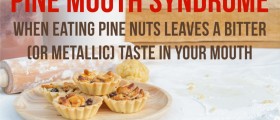I am really struggling and have been for several years. It started in 2014 when I would cough or clear my throat or sneeze I would get this nasty smell/taste. As the years have gone by it now appears almost daily, sometimes 2 or 3 different times a day, without coughing, clearing my throat or sneezing. I have started using a sinugator which makes the taste and smell go away, but lately it comes back within seconds. The only thing that makes this nasty smell/taste completely go away is if I go to sleep or I start crying. I’ve seen multiple doctors and none are helping. This was a metallic taste at first, then I started getting a burnt smell/taste but only in my right nostril. If I get the burnt taste, I have to use my sinus rinse in my right nostril for it to go away, if I get the other sour/metallic taste/smell I have to use the rinse in my left nostril. I’ve had dental work done and my pcp and I have decided this is not caused by my teeth as I have had the problems fixed. I’ve come across other people on here that have the same symptoms but now I can’t find it back. Does anyone have any suggestions? I am desperate. Thank you.
Loading...
Hello.
A persistent altered taste or smell can be distressing, especially when there's no clear cause or resolution.
Based on what you've described, a few possible considerations come to mind:
-
Sinus issues: Chronic sinusitis or other sinus problems can cause altered taste and smell. You mentioned using a "sinugator" (a device for performing nasal irrigation), which suggests that you might be dealing with sinus-related issues.
-
Post-nasal drip: This is where mucus from the nose goes down the back of the throat. If the mucus is infected or contains irritating substances, it can lead to a metallic or foul taste.
-
Acid reflux: Gastroesophageal reflux disease (GERD) or other types of acid reflux can sometimes cause a metallic or sour taste in the mouth, especially if stomach acid reaches the throat or mouth.
-
Neurological conditions: Issues with the nerves related to taste and smell, such as the olfactory nerve, could result in alterations or disturbances in these senses.
-
Metallic tastes: Can sometimes be associated with medications, vitamin deficiencies (like zinc deficiency), or other medical conditions.
-
Phantosmia: This is a condition where you perceive a smell that isn't actually present. It's a form of olfactory hallucination and can be due to a variety of causes, ranging from sinus issues to neurological conditions.
-
Oral health: Even though you've had dental work done and have discussed this with your primary care physician, conditions like gingivitis, periodontitis, or infections can sometimes lead to altered taste or bad breath. It might still be worth getting a thorough checkup with a dentist or periodontist to rule out all possibilities in this area.
Given that you've seen multiple doctors without a resolution, you might consider:
-
Seeking a second opinion from a different specialist, such as an otolaryngologist (ENT doctor) who can assess sinus, throat, and ear conditions that might be affecting your taste and smell.
-
Visiting a neurologist to rule out any neurological causes.
-
Ensuring you have had a comprehensive review of any medications you are on, as some can cause changes in taste or smell as side effects.
-
Consider lifestyle factors, such as diet, exposure to toxins, or other environmental factors, which might contribute.
Hope this helps.
Loading...
















